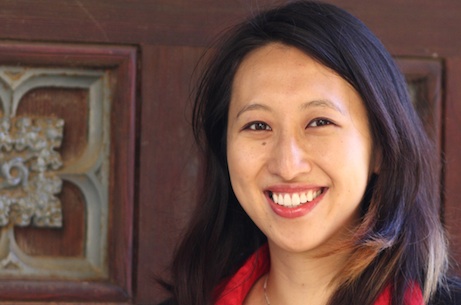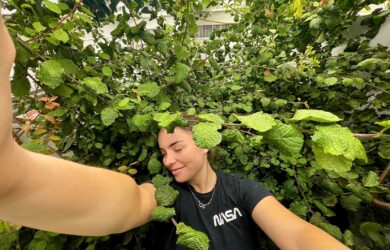
Less than a year after finishing her PhD, Julia Fan Li is directing a $94m investment fund for global health.
Less than a year after finishing her PhD, Julia Fan Li is directing a $94m investment fund which will finance research and development for some of the most pressing global health challenges.
Her role as director of the Global Health Investment Fund is inextricably linked to her time at the University of Cambridge and to her Gates Cambridge Scholarship. While Julia was doing her MPhil in Bioscience Enterprise she met a global health entrepreneur and was inspired to think about an idea for a new social venture capital fund to finance global health R&D. She already had a passion for finding new ways to finance health. She had done her undergraduate degree in finance and immunology and had several years of experience in the business side of biotechnology, having worked as a chartered accountant for KPMG’s Canadian biotechnology practice.
At the end of her MPhil year in June 2009, she gave a presentation on her idea at a Gates Cambridge internal symposium attended by Bill Gates Senior, then Chair of the Gates Cambridge Trust. She had done her research beforehand to see whether the Bill & Melinda Gates Foundation had considered setting up an investment fund for health. During her 2009 Easter vacation she contacted the Foundation’s head office in Seattle and arranged to drive down from her hometown of Vancouver to knock on the door of the Foundation’s global health team. They explained that the Foundation restricted itself to giving grants and did not do investments. Julia was convinced, however, that the idea could be brought to fruition and shared it with friends and classmates on a blog post and summarised her findings from her initial visit to the Gates Foundation.
She opted to do a PhD at Cambridge, again with a Gates Cambridge Scholarship, on the subject of innovative financing for global health. In her first year, she was seconded for a term to the World Health Organisation as a technical officer to provide policy advice to a WHO Working Group on Research and Development: Financing & Coordination. During her PhD, she wrote regular blogs on her research for Nature Biotechnology, taking opportunities to present the social venture fund idea at TEDxOxbridge and at the Berlin’s Falling Walls Lab conference in 2011, as well as connecting with other like-minded advocates on Twitter. At the same time, the Bill & Melinda Gates Foundation were changing their minds about global health investments and started making direct equity investments in 2011.
In 2012 at the end of her PhD, Julia organised a conference on global health and finance, bringing everyone working in the area together, including the Wellcome Trust and member state representatives from Brazil and Rwanda. She had good contacts in Rwanda due to her work on the African Innovation Prize (AIP), which she co-founded while at Cambridge.
Investment fund
At the conference, Julia [2008] reconnected with Christopher Egerton-Warburton, Founding Partner of the Investment Manager, LHGP Asset Management (“Lion’s Head”), who was looking into the possibility of setting up an investment fund. “The idea became more real when I could see that the wheels were already in motion,” says Julia.
The fundraising for the Global Health Investment Fund started in March 2012 and by December when Julia joined after completing her PhD, it had reached the sum of $55m.
Since December her work has been 60% building the research and development transaction pipeline and 40% fundraising. She anticipates that now the launch is over 90% of her time will be taken up with operational matters and 10% with investor relations and the governance structure of GHIF. “Working for the GHIF feels like a continuation of my PhD, the goal has not changed – to commercialise global health drugs and vaccines – but the realm has shifted from theory to practice,” she says Julia, who is based in Westminster, London.
“GHIF functions like a normal investment fund,” she adds. “We look for new initiatives in global health and invest in the companies developing them after conducting due diligence.” The fund, which will be in place for 10 years, has both an independent investment committee and a charitable oversight committee to ensure everything they invest in has an impact on global health. Each committee has the power to veto an investment transaction.
The GHIF is structured by JPMorgan Chase & Co. and the Bill & Melinda Gates Foundation. With $94 million committed by a pioneering group of investors – including anchor support from Grand Challenges Canada (funded by the Government of Canada), the German Ministry for Economic Cooperation and Development and the Children’s Investment Fund Foundation – the fund will help advance the most promising interventions to fight challenges in low-income countries such as malaria, tuberculosis, HIV/AIDS and maternal and infant mortality. To help mitigate the risk of investing in the clinical development of new technologies, the Gates Foundation and the Swedish International Development Cooperation Agency have committed to partially offset potential losses in the Fund, which will seek a financial return for investors by targeting high-impact technologies with public health applications in both developed and emerging markets.
Julia says: “I am very grateful for the Gates Cambridge Trust and their support for my research four years ago when GHIF was just an idea. Innovative finance for global health including new ideas and vehicles are important to continue long-term support for research and development. Innovation, social impact and access in health need to be considered together.”












